
September-October 2021 Newsletter
 
Critical Perspectives in Quantitative Methods
The quantitative methods on which members of the educational research community often rely have a troubling history, with their application sometimes being used to reify rather than combat societal inequities. The SREE Board recognizes an overdue need to investigate and foster strategies and tools in our research communities’ perspectives that will promote research that is culturally responsive and works toward the goal of equity in education along dimensions of race, socioeconomic status and gender, among others. To support the SREE community and the broader education research community in working toward these important goals, SREE is pleased to be launching a webinar series on the topic and providing an in-depth training workshop geared specifically to the education research community.
Critical Perspectives in Quantitative Methods Webinar Series
SREE is pleased to be kicking off its Critical Perspectives in Quantitative Methods webinar series this month! The live webinar was held on October, 22nd, 2021 but you can still register to access to the recording here. Here are the details:
Title: Critical Perspectives in Quantitative Methods: Introduction, Historical Origins and Future Possibilities
Speakers: Veronica Velez, Western Washington University, Nichole Garcia, Rutgers University, and Jay Garvey, University of Vermont
Description: The first webinar outlines the contours of critical quantitative research, particularly QuantCRIT (a methodological subfield of Critical Race Theory) by (a) examining the history, assumptions, and principles of QuantCrit and other critical perspectives in quantitative research and methods; and (b) illustrating these approaches in practice. Attendees will earn about the historical origins of critical quantitative methods, contemporary uses of critical quantitative methods, and possibilities for advancements in critical quantitative methods.
SREE is co-hosting the series with the Association for Education Finance and Policy (AEFP), the American Educational Research Association – Division L, and the Council on Public Policy in Higher Education (CPPHE), a Council of the Association for the Study of Higher Education (ASHE) on critical perspectives in quantitative research. The webinars will be recorded and available for public viewing. The second in the series will be in early 2022.
Culturally Responsive and Equitable Evaluation Workshop
In collaboration with We All Count, SREE offered a Culturally Responsive & Equitable Evaluation (CREE) training geared specifically to the education research community. During the 3-part training, researchers learned how to make their research and evaluations more culturally responsive, inclusive, and equitable. The workshop included steps researchers can take at every stop of the research process-from formulation of the research question through dissemination. If you missed it and are interested in training, you can register to take the class by watching the recordings. SREE also plans to offer the live training again in 2022—details will be shared when available.
Strategic Plan
 The SREE Board adopted a strategic plan in August 2020 to guide its work over the next three years. The plan includes a modified mission and vision statement and the objectives of: a) elevating SREE’s position as a leader in the development and use of rigorous research methods and the application of evidence to inform educational policy and practice, b) building a more inclusive and representative community, and c) achieving financial sustainability. The Board invites the SREE community to share feedback or ask questions by sending an email to [email protected]. The SREE newsletter and SREE website will provide regular updates on the implementation of the plan. The SREE Board adopted a strategic plan in August 2020 to guide its work over the next three years. The plan includes a modified mission and vision statement and the objectives of: a) elevating SREE’s position as a leader in the development and use of rigorous research methods and the application of evidence to inform educational policy and practice, b) building a more inclusive and representative community, and c) achieving financial sustainability. The Board invites the SREE community to share feedback or ask questions by sending an email to [email protected]. The SREE newsletter and SREE website will provide regular updates on the implementation of the plan.
SREE 2021 CONFERENCE RECAP: The Fierce Urgency of Knowledge: Education Evidence for Reimagining and Reckoning
SREE's Annual Conference held in September was a great success, with hundreds logging on to network, share information and resources, and discuss the most pressing challenges in education. Conference registrants may access any of the regular conference sessions at their convenience by logging onto the conference site here. The sessions will be available through the end of 2021.
Our 2021 conference chairs, Henry May, University of Delaware, and Atnre Alleyne, TeenSharp, deserve a big thank you for their hard work during the past year. Along with an amazing program committee, they created a memorable conference experience for the SREE community!
We also want to express appreciation to our 2021 sponsors: AIR, Spencer Foundation, Wallace Foundation, Abt, Arnold Ventures, Ascendium, MDRC, WestEd, William Penn Foundation, NWEA, and William T. Grant Foundation.
Thank you to all who completed the feedback survey. We randomly selected 3 respondents to receive a free 2022 SREE membership. Congratulations to Thomas Kelley-Kemple, Dea Mulolli, and Michael Bock!
The following plenaries are now available to view here:
Hedges Lecture: Are We There Yet? Reflections on 35 Years of Statistical Journeys into the Science of Reading, Language, Learning and Education by Lecturer, David Francis, University of Houston. This talk examined the important role that statistical models have played over the last thirty-five years in advancing our understanding about the development of reading and language and the related concepts of reading and language disabilities.
Keynote Session: A Call to Action for Education Researchers in the Post-Pandemic Landscape with Moderator Atnre Alleyne, Executive Director, Teensharp and SREE 2021 Conference Co-Chair, and Panelists John Q. Easton, University of Chicago, John B. King, Jr., Education Trust, and Na’ilah Suad Nasir, Spencer Foundation. This panel discussion provided thoughtful discussion within the SREE community about the improvements to our education system that are necessary to address long-standing inequities and disparities in opportunities and outcomes, and the role that research evidence plays.
Student Plenary Session: Student Perspectives on the "Urgency of Now" in Education. Atnre Alleyne, Co-Founder of TeenSHARP and Founder of The Proximity Project, moderated a panel discussion among current university students: Tyler Busch, Sophomore at University of Virginia, Lucia Gotera, Freshman at University of Pennsylvania, Tariah Hyland, Freshman at Howard University, and Elijah Jones, Sophomore at Gettysburg College. The discussion involved sharing perspectives on the current state of education, future opportunities to improve learning, and what they feel they need from the education research community.
Save the Date for SREE's next Annual Conference on September 21-24, 2022!
Summer Fellowship
Congratulations to the 2021 summer fellows who have successfully completed their research: Katrina Borowiec, Boston College Lynch School of Education and Human Development; Claire Chuter, John Hopkins School of Education; Jeremy Martin, University of California - Berkeley; Gabe Avakian Orona, University of California - Irvine; Jason Saltmarsh, University of Maryland - College Park; and Madeleine Yount, College of Engineering at Boise State University.
To date, fourteen SREE student members have participated in the SREE Summer Fellows Program, created in collaboration with Grantmakers for Education Learning, Evaluation & Data (LEAD) Impact Group. The students spent the summer conducting a literature review on a topic selected by the funding organization, with the goal of providing information the organization can use to inform its philanthropic work.
Executive summaries and additional work products from this year's fellows will be posted on the SREE website here.
We will begin accepting applications for the 2022 summer fellowship program in early 2022, so stay tuned!
Institutional Member Corner
Strategic Data Project
Applications are now open to become a Strategic Data Project Fellow for the Fall 2022 – Summer 2024 cohort! 
The Strategic Data Project (SDP) is a program of the Center for Education Policy Research, a nonprofit organization, housed in Harvard University’s Graduate School of Education. SDP finds and develops data leaders to uncover trends, measure solutions, and effectively communicate evidence to stakeholders in education. The SDP Fellowship program provides a unique opportunity for passionate quantitative researchers and data strategists who want to put their skills to work to improve public education. SDP Fellows are placed in PK12 and Higher Education school systems and education organizations across the country as full-time employees for two years, where they will affect positive change and execute on a key analytic project for their placement while accumulating skills and experiences that can advance their careers. Learn more about former fellows’ work at sdp.cepr.harvard.edu/blog.
We’re seeking future data leaders who are committed to improving outcomes for all students across the PK12 and/or Higher Education landscape. Eligible candidates will have a Masters or PhD by summer 2022, 4 years minimum of full-time work experience, a strong quantitative skillset, and emerging leadership and communication skills.
Applications open October 4, and the priority deadline for applications is November 1, 2021. There are several ways you can learn more about the fellowship, including:
• Visit our website
• Sign up to attend an informational webinar
• Sign up for a Virtual Coffee Chat
Questions? Email [email protected]
Ready to apply? Visit sdp.cepr.harvard.edu/apply
Decision Information Resources, Inc.
Decision Information Resources Welcomes Dr. Joy Kang as Director of Data Management
 Decision Information Resources (DIR) is pleased to announce the appointment of Dr. Joy Kang as director of data management. She has over ten years of experience designing and implementing data management strategies and conducting research and data analysis. Dr. Kang joins DIR from the NYC Department of Health and Mental Hygiene, where she served as the Deputy Director of Research and Evaluation in the Bureau of Mental Health. In this role, she led a team of data analysts in managing the planning, development, and implementation of data systems, program analytics, and metric development. Dr. Kang worked closely with program stakeholders to define, measure, and report key performance indicators to aid in program management and program evaluation. She has led both primary data collection projects and secondary data analysis of large population-level surveys and administrative data sources. Dr. Kang is well-versed in research and survey design and methodology, statistical analysis, reporting and data visualization, and disseminating data findings via presentations and peer-reviewed papers. Decision Information Resources (DIR) is pleased to announce the appointment of Dr. Joy Kang as director of data management. She has over ten years of experience designing and implementing data management strategies and conducting research and data analysis. Dr. Kang joins DIR from the NYC Department of Health and Mental Hygiene, where she served as the Deputy Director of Research and Evaluation in the Bureau of Mental Health. In this role, she led a team of data analysts in managing the planning, development, and implementation of data systems, program analytics, and metric development. Dr. Kang worked closely with program stakeholders to define, measure, and report key performance indicators to aid in program management and program evaluation. She has led both primary data collection projects and secondary data analysis of large population-level surveys and administrative data sources. Dr. Kang is well-versed in research and survey design and methodology, statistical analysis, reporting and data visualization, and disseminating data findings via presentations and peer-reviewed papers.
As the director of data management for DIR, Dr. Kang will provide administrative and operational leadership to the data management functions and staff of DIR. She will develop and implement processes and oversee various tasks for DIR’s data management activities for all data collection methodologies. These methodologies include telephone (CATI), web-based, field surveys; student assessments; classroom observations; focus groups and in-depth interviews; and other primary data collection. Dr. Kang will provide leadership, supervision, and direction to her data management team comprised of both mid-level and administrative level staff responsible for data processing and data analysis; database development, management, and reporting; sample management, tracking, and incentive distribution; and survey programming.
As a member of DIR’s Executive Team, Dr. Kang will work closely with other executive management team members to execute projects, manage company performance, develop new business, and liaison with external clients and vendors.
Dr. Kang earned her Ph.D. and M.A. degrees in Social and Quantitative Psychology from New York University.
MDRC
Recent resources from MDRC
Nonprofit, nonpartisan MDRC builds evidence and provides technical assistance across the education policy spectrum—from preschool to postsecondary. Here are some recent releases:
Three Ways to Improve the Quality of Preschool Programs
In this commentary, originally published in District Administration, MDRC’s Michelle Maier and Shira Mattera offer evidenced-backed advice for policymakers and practitioners about how to invest new federal funds to enhance the quality of preschool programs.
Investing in Equitable Access to High-Quality Early Care and Education
Children in low-income communities are less likely than others to attend programs that improve kindergarten readiness. MDRC has identified two ways to promote more equitable access: Make information about existing high-quality programs easier to understand and improve quality by investing in curricula and professional development.
Ideas from Experts on How Districts Can Create the Conditions for Sustainable Change: Educational Equity Through Social and Emotional Well-Being
This is the second in a series of briefs highlighting strategies to increase educational equity by addressing students’ social and emotional needs. This brief shares the experiences and recommendations of leaders who are working to reexamine districts’ systems, structures, and policies to ensure they support all students.
Bridging the School-to-Work Divide: Interim Implementation and Impact Findings from New York City’s P-TECH 9-14 Schools
This report evaluates a program focused on preparing students for college and career. Based on partnerships among high schools, community colleges, and employers, the program offers accelerated high school course work, early college, and work-based learning experiences. The findings suggest that students are meeting the benchmarks they need to succeed.
Using Theories of Change to Systematically Take Stock of Program Changes During COVID-19
Implementation researchers can be good partners to program operators at this difficult time—by being sensitive to the new constraints that programs face, by assessing how learning agendas and evaluation plans need to change, and by helping programs learn from the adaptations they are making in response to the pandemic.
Equity Metrics, Measures, and Analytic Approaches in Education Research
MDRC’s Equity Collaborative has compiled examples of metrics, data displays, and analytic approaches to help fellow researchers more fully measure equity both as a condition and as an outcome in studies focused on education.
Improving College Graduation Rates with Multifaceted Student Support Programs: Here’s What Institutions and State Agencies Need to Know
This brief summarizes the evidence from studies of multifaceted support programs aimed at boosting college graduation rates. It examines what works and the state and institutional factors necessary for successful implementation, and it offers advice on how to balance fidelity with local needs while measuring and ensuring positive impacts.
What Happens After the Program Ends? A Synthesis of Post-Program Effects in Higher Education
Some education programs’ early positive effects disappear over time, while other programs have unanticipated positive long-term effects. This Issue Focus introduces The Higher Education Randomized Controlled Trials, an examination of program effects after a postsecondary education program ends, using a database drawn from 31 MDRC projects, sampling 67,400 students.
Strengthening Emergency Aid Programs: Lessons from the CARES Act and the Higher Education Emergency Relief Fund
This brief summarizes recent findings about the rollout of the federal emergency aid program for higher education during the COVID-19 pandemic. It offers recommendations and resources for policymakers and practitioners interested in developing or implementing future programs in a time of national crisis as well as in more stable times.
To get the latest from MDRC, subscribe to our twice-monthly newsletter—and follow us on Twitter, Facebook, and LinkedIn.
Education Testing Services (ETS)
ETS is looking for a passionate, social justice-oriented research scientist to contribute to the work of its Center for Validity, Fairness, and Equity in Learning and Assessment. The scientist will be part of a team of dedicated researchers and will play a pivotal role in a new program of research to design the next generation of socioculturally responsive assessments, advance new methodologies in examining fairness, and promote the role of assessment in advancing equity. The ideal candidate will combine expertise in measurement and research with a commitment to ensuring that assessments and learning tools contribute to increased equity of opportunities for all learners. Application information is available here: Research Scientist #315156 on the ETS Careers page.
Interested applicants are welcome to contact Michael Walker, Director of the Center for Validity, Fairness, and Equity in Learning and Assessment ([email protected]), or Laura Hamilton, Associate Vice President of the ETS Research Centers ([email protected]).
Westat
Westat’s Education Studies Practice is seeking candidates for two positions: a principal research associate and an education researcher.
The principal research associate will lead education evaluations and proposals. A great candidate will bring experience successfully directing large-scale impact or implementation evaluations for federal agencies, a strong track record of winning large-scale evaluation proposals, and subject matter expertise in important topics in education. Key qualifications include a master’s or doctoral degree in a social science field, 10 or more years of experience in education research, and experience serving as a project director, deputy project director, or principal investigator on at least one evaluation for the Institute of Education Sciences. Apply for this position at westat.com.
The education researcher will contribute to research teams conducting evaluations of educational interventions. A strong candidate will have a doctoral degree in the social sciences and excellent quantitative, analytic, and communication skills. Key qualifications include a doctoral degree in a social science field completed or expected completion by June 2022, a dissertation on an education policy topic, and experience manipulating data and conducting advanced statistical analyses with software packages. Apply for this position at westat.com.
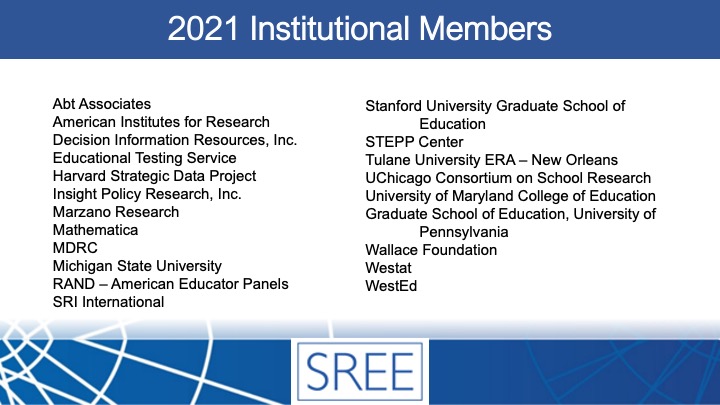
Job Board
|








 The SREE Board adopted a strategic plan in August 2020 to guide its work over the next three years. The plan includes a modified mission and vision statement and the objectives of: a) elevating SREE’s position as a leader in the development and use of rigorous research methods and the application of evidence to inform educational policy and practice, b) building a more inclusive and representative community, and c) achieving financial sustainability. The Board invites the SREE community to share feedback or ask questions by sending an email to
The SREE Board adopted a strategic plan in August 2020 to guide its work over the next three years. The plan includes a modified mission and vision statement and the objectives of: a) elevating SREE’s position as a leader in the development and use of rigorous research methods and the application of evidence to inform educational policy and practice, b) building a more inclusive and representative community, and c) achieving financial sustainability. The Board invites the SREE community to share feedback or ask questions by sending an email to 
 Decision Information Resources (DIR) is pleased to announce the appointment of Dr. Joy Kang as director of data management. She has over ten years of experience designing and implementing data management strategies and conducting research and data analysis. Dr. Kang joins DIR from the NYC Department of Health and Mental Hygiene, where she served as the Deputy Director of Research and Evaluation in the Bureau of Mental Health. In this role, she led a team of data analysts in managing the planning, development, and implementation of data systems, program analytics, and metric development. Dr. Kang worked closely with program stakeholders to define, measure, and report key performance indicators to aid in program management and program evaluation. She has led both primary data collection projects and secondary data analysis of large population-level surveys and administrative data sources. Dr. Kang is well-versed in research and survey design and methodology, statistical analysis, reporting and data visualization, and disseminating data findings via presentations and peer-reviewed papers.
Decision Information Resources (DIR) is pleased to announce the appointment of Dr. Joy Kang as director of data management. She has over ten years of experience designing and implementing data management strategies and conducting research and data analysis. Dr. Kang joins DIR from the NYC Department of Health and Mental Hygiene, where she served as the Deputy Director of Research and Evaluation in the Bureau of Mental Health. In this role, she led a team of data analysts in managing the planning, development, and implementation of data systems, program analytics, and metric development. Dr. Kang worked closely with program stakeholders to define, measure, and report key performance indicators to aid in program management and program evaluation. She has led both primary data collection projects and secondary data analysis of large population-level surveys and administrative data sources. Dr. Kang is well-versed in research and survey design and methodology, statistical analysis, reporting and data visualization, and disseminating data findings via presentations and peer-reviewed papers.